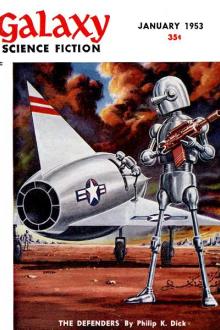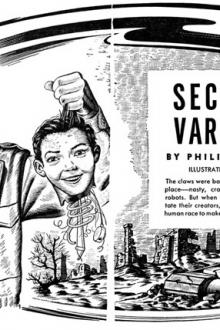Short Fiction, Philip K. Dick [best large ereader .txt] 📗

- Author: Philip K. Dick
Book online «Short Fiction, Philip K. Dick [best large ereader .txt] 📗». Author Philip K. Dick
There was silence.
“Do you believe that?” Tasso said to Hendricks.
“Yes. I believe what he says.”
“I don’t. I think he killed Rudi for a good purpose.” Tasso touched the rifle, resting in the corner of the room. “Major—”
“No.” Hendricks shook his head. “Let’s stop it right now. One is enough. We’re afraid, the way he was. If we kill him we’ll be doing what he did to Rudi.”
Klaus looked gratefully up at him. “Thanks. I was afraid. You understand, don’t you? Now she’s afraid, the way I was. She wants to kill me.”
“No more killing.” Hendricks moved toward the end of the ladder. “I’m going above and try the transmitter once more. If I can’t get them we’re moving back toward my lines tomorrow morning.”
Klaus rose quickly. “I’ll come up with you and give you a hand.”
The night air was cold. The earth was cooling off. Klaus took a deep breath, filling his lungs. He and Hendricks stepped onto the ground, out of the tunnel. Klaus planted his feet wide apart, the rifle up, watching and listening. Hendricks crouched by the tunnel mouth, tuning the small transmitter.
“Any luck?” Klaus asked presently.
“Not yet.”
“Keep trying. Tell them what happened.”
Hendricks kept trying. Without success. Finally he lowered the antenna. “It’s useless. They can’t hear me. Or they hear me and won’t answer. Or—”
“Or they don’t exist.”
“I’ll try once more.” Hendricks raised the antenna. “Scott, can you hear me? Come in!”
He listened. There was only static. Then, still very faintly—
“This is Scott.”
His fingers tightened. “Scott! Is it you?”
“This is Scott.”
Klaus squatted down. “Is it your command?”
“Scott, listen. Do you understand? About them, the claws. Did you get my message? Did you hear me?”
“Yes.” Faintly. Almost inaudible. He could hardly make out the word.
“You got my message? Is everything all right at the bunker? None of them have got in?”
“Everything is all right.”
“Have they tried to get in?”
The voice was weaker.
“No.”
Hendricks turned to Klaus. “They’re all right.”
“Have they been attacked?”
“No.” Hendricks pressed the phone tighter to his ear. “Scott, I can hardly hear you. Have you notified the Moon Base? Do they know? Are they alerted?”
No answer.
“Scott! Can you hear me?”
Silence.
Hendricks relaxed, sagging. “Faded out. Must be radiation pools.”
Hendricks and Klaus looked at each other. Neither of them said anything. After a time Klaus said, “Did it sound like any of your men? Could you identify the voice?”
“It was too faint.”
“You couldn’t be certain?”
“No.”
“Then it could have been—”
“I don’t know. Now I’m not sure. Let’s go back down and get the lid closed.”
They climbed back down the ladder slowly, into the warm cellar. Klaus bolted the lid behind them. Tasso waited for them, her face expressionless.
“Any luck?” she asked.
Neither of them answered. “Well?” Klaus said at last. “What do you think, Major? Was it your officer, or was it one of them?”
“I don’t know.”
“Then we’re just where we were before.”
Hendricks stared down at the floor, his jaw set. “We’ll have to go. To be sure.”
“Anyhow, we have food here for only a few weeks. We’d have to go up after that, in any case.”
“Apparently so.”
“What’s wrong?” Tasso demanded. “Did you get across to your bunker? What’s the matter?”
“It may have been one of my men,” Hendricks said slowly. “Or it may have been one of them. But we’ll never know standing here.” He examined his watch. “Let’s turn in and get some sleep. We want to be up early tomorrow.”
“Early?”
“Our best chance to get through the claws should be early in the morning,” Hendricks said.
The morning was crisp and clear. Major Hendricks studied the countryside through his fieldglasses.
“See anything?” Klaus said.
“No.”
“Can you make out our bunkers?”
“Which way?”
“Here.” Klaus took the glasses and adjusted them. “I know where to look.” He looked a long time, silently.
Tasso came to the top of the tunnel and stepped up onto the ground. “Anything?”
“No.” Klaus passed the glasses back to Hendricks. “They’re out of sight. Come on. Let’s not stay here.”
The three of them made their way down the side of the ridge, sliding in the soft ash. Across a flat rock a lizard scuttled. They stopped instantly, rigid.
“What was it?” Klaus muttered.
“A lizard.”
The lizard ran on, hurrying through the ash. It was exactly the same color as the ash.
“Perfect adaptation,” Klaus said. “Proves we were right. Lysenko, I mean.”
They reached the bottom of the ridge and stopped, standing close together, looking around them.
“Let’s go.” Hendricks started off. “It’s a good long trip, on foot.”
Klaus fell in beside him. Tasso walked behind, her pistol held alertly. “Major, I’ve been meaning to ask you something,” Klaus said. “How did you run across the David? The one that was tagging you.”
“I met it along the way. In some ruins.”
“What did it say?”
“Not much. It said it was alone. By itself.”
“You couldn’t tell it was a machine? It talked like a living person? You never suspected?”
“It didn’t say much. I noticed nothing unusual.”
“It’s strange, machines so much like people that you can be fooled. Almost alive. I wonder where it’ll end.”
“They’re doing what you Yanks designed them to do,” Tasso said. “You designed them to hunt out life and destroy. Human life. Wherever they find it.”
Hendricks was watching Klaus intently. “Why did you ask me? What’s on your mind?”
“Nothing,” Klaus answered.
“Klaus thinks you’re the Second Variety,” Tasso said calmly, from behind them. “Now he’s got his eye on you.”
Klaus flushed. “Why not? We sent a runner to the Yank lines and he comes back. Maybe he thought he’d find some good game here.”
Hendricks laughed harshly. “I came from the U.N. bunkers. There were human beings all around me.”
“Maybe you saw an opportunity to get into the Soviet lines. Maybe you saw your chance. Maybe you—”
“The Soviet lines had already been taken over. Your lines had been invaded before I left my command bunker. Don’t forget that.”
Tasso came up beside him. “That proves nothing at all, Major.”
“Why not?”
“There appears to be little communication between the varieties. Each is made in a different factory. They don’t seem to work together. You might





Comments (0)